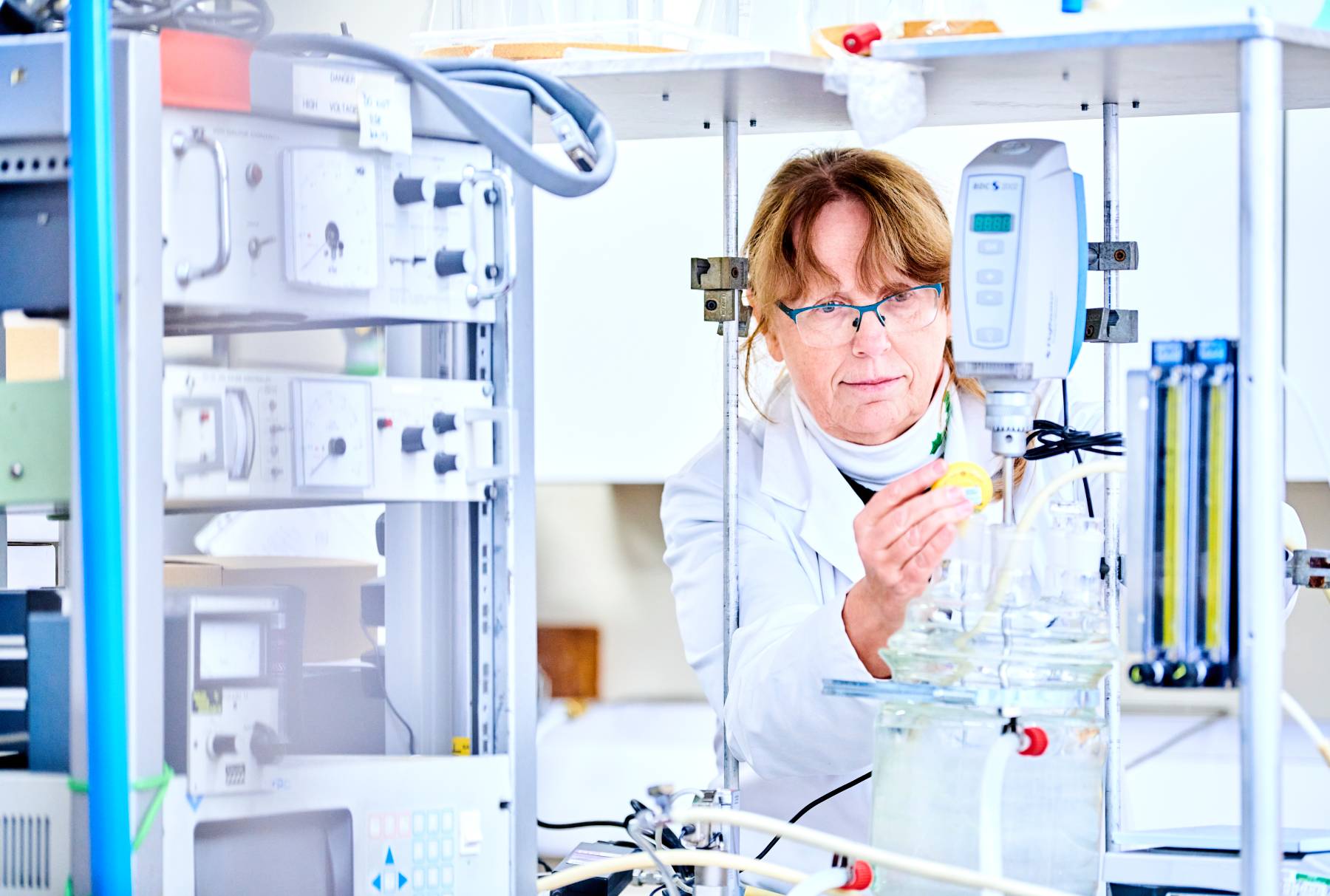Staff Profile
Dr Pavlina Theodosiou
Lecturer in Environmental Engineering
- Email: pavlina.theodosiou@ncl.ac.uk
- Personal Website: https://www.linkedin.com/in/pavlinatheodosiou/
About me
I have been part of the Environmental Engineering group since 2020, initially working as a postdoctoral researcher on the EPSRC-funded BIOHEAT project (PI: Dr Elizabeth Heidrich) and later on as a lecturer in Environmental Engineering. My research expertise is in the field of wastewater treatment innovation using Microbial Electrochemical Technologies (METs), also called Bioelectrochemical Systems (BES), which I started researching as part of my PhD in 2014.
METs treat the wastewater anaerobically whilst recovering valuable resources from it, such as hydrogen. Through my research work, I developed a deeper understanding of how we can efficiently engineer these systems for improved resource recovery and got the opportunity to work on the world's biggest pilot-scale microbial electrolysis cell (3000L) installed and operated at the BEWIse Wastewater Treatment Innovation Facility.
My overall mission in life is to contribute to decarbonising the wastewater treatment industry and realise my vision of seeing wastewater treatment plants (WWTP) turned into resource recovery plants. To realise this vision, we need to harness the trapped energy of wastewater and work collaboratively with other innovative technologies to transform the sector from an energy consumer to an energy producer. This can be achieved by commercialising promising technologies that have evolved from years of robust academic research and development.
Background
Pavlina has a background in Biological Sciences (BSc) and an Engineering PhD focusing on Bioenergy and Self-Sustainable Systems from UWE, Bristol. The European Commission funded her PhD under the project name EVOBLISS (FP-7), and she conducted her work at the University of the West of England under the supervision of Prof. Ioannis Ieropoulos. Prof. John Greenman and Dr Jonathan Winfield. On EvoBliss she worked with partners from Denmark (IT University of Copenhagen), Italy (University of Trento), Germany (Karlsruhe Institute of Technology) and Scotland (University of Glasgow). For her thesis, Pavlina presented the work she achieved using the robotic platform EvoBot, a 3D printer turned into a robot, which she used as an automated Robot-Chemostat for culturing and maintaining Microbial Fuel Cells (MFCs). Her work resulted in improved MFCs, which were robotically cultivated and then used on board the 2018 edition EcoBot-II, resulting in almost continual motion (movement every 45 seconds). Her work was awarded the "Best Biology Paper" at the 6th Living Machines Conference at Stanford University.
Before moving to Newcastle University, she completed a post-doc at the Bristol Bioenergy Centre, where she worked on the PeePowerTM technology, funded by the Bill and Melinda Gates Foundation and OXFAM. Her role was in researching and developing Microbial Fuel Cell (MFC) systems for practical applications. During that project, she travelled to East African slums and camps where she installed and maintained these systems. The MFCs were installed in toilet blocks and provided lighting at night by converting urine into electricity.
Furthermore, Pavlina is a passionate science communicator a trained STEM ambassador, and has delivered numerous science outreach activities in schools and science festivals. She has both delivered and assisted in the delivery of MFC workshops to local primary and secondary schools. She has also delivered conference and summer school workshops on MFCs and self-sustainable robots to postgraduate researchers and academics, both in the UK and abroad.
Google Scholar: Click here
ResearchGate: Click here
Teaching Activity
Module Leader:
- CEG8198: MSc Project and Dissertation in Environmental Engineering (Newcastle University - MSc Level)
- CEG8110: Project skills and professional development (Newcastle University - MSc Level)
Teaching at:
- CEG8114: Core Skills in Environmental Engineering (Newcastle University - MSc Level)
- CEG8104: Wastewater Engineering (Newcastle University - MSc Level)
- CEG3004 Design of Sustainable Engineering Systems (Newcastle University - Stage 3 BEng/MEng)
Supervisory and co-supervisory roles in the following projects:
- A review of pilot-scale Microbial Fuel Cells (MFCs) - PG Level Project (MSc)
- Paper-based Microbial Fuel Cell biosensors for toxicity detection – UG Project (BEng)
- Development of a wastewater treatment process using graphene filter and Microbial Fuel Cells – UG Project (BEng)
- Exploration of 3D-printed ceramics as membranes for Microbial Fuel Cells - UG Project (BEng)
- Low-power vision for EcoBot-II for food exploration – PG Level Project (MEng)
- Energy-sufficient PeePower feeding system for autonomous MFC stacks – PG Level Project (MEng)
Guest lecturer at:
- Scientific Frontiers and Enterprise - Department of Health and Applied Sciences, UWE Bristol
- Sustainable Energy Technologies - Department of Engineering Design and Mathematics, UWE Bristol
- Cell Biology, Biochemistry and Genetics - Department of Health and Applied Sciences, UWE Bristol
Research Interests
Pavlina's research interests include but are not restricted to;
- Microbial Fuel Cells (MFCs)
- Bioelectrochemical systems (BES)
- Environmental Engineering
- Low-power robots
- 3D-printing
- Malleable and biocompatible structures
- Sustainability and Resources
- Bioenergy
- Wastewater Treatment
- Thermodynamics
- Renewable Energy
Esteem Indicators
Reviewer for Journal of Power Sources (awards for outstanding contribution in reviewing 2017 & 2018)
Journal of Environmental Chemical Engineering
Indian Journal of Microbiology and Bioresource Technology
-
Review
- Bird H, Heidrich ES, Leicester DD, Theodosiou P. Pilot-scale Microbial Fuel Cells (MFCs): A meta-analysis study to inform full-scale design principles for optimum wastewater treatment. Journal of Cleaner Production 2022, 346, 131227.
